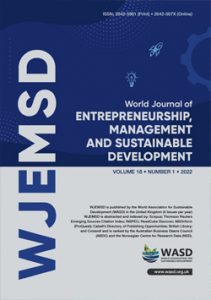The impact of entrepreneurship education on innovative start-up intention: the mediating role of entrepreneurial mind-sets, Dr. Rami Hanandeh, Dr. Sakher Alnajdawi, Dr. Ammar Almansour and Dr. Hamzah Elrehail
 Dr. Rami Hanandeh, Dr. Ammar Almansour
Dr. Rami Hanandeh, Dr. Ammar Almansour
School of Business, Faculty of Business
Amman Arab University, Amman
Jordan
Dr. Sakher M.A. Alnajdawi
Department of Business Administration, College of Administrative Science
Applied Science University, Manama
Bahrain
Dr. Hamzah Elrehail
Abu Dhabi School of Management, Abu Dhabi
United Arab Emirates
Email: cs-hamzah@hotmail.com/h.elrehail@adsm.ac.ae
DOI: 10.1108/WJEMSD-02-2020-0016
Purpose: Entrepreneurship education at universities aims to create entrepreneurial thinking and spread the culture of entrepreneurial awareness, skills and attitudes to students to stimulate their entrepreneurship intentions as graduates. This study investigates the impact of entrepreneurship education on innovative start-up intention as well as the mediating role of entrepreneurial mind-sets of university students.
Design/methodology/approach: Structural equation modeling (SEM) was used for analysis with (n = 204) valid questionnaires collected from university students.
Findings: The main findings show that entrepreneurial mind-sets mediate the relationship between entrepreneurship education and innovative start-up intention.
Originality/value: This study contributes to the body of knowledge by its application in a higher educational institution and enriches the literature with new evidence that entrepreneurship education could enhance innovative start-up intention.
Keywords: Entrepreneurship education; Innovative start-up intention; Entrepreneurial mind-sets; Social education; Extracurricular programmes; Curricular programmes.
Citation: Hanandeh, R., Alnajdawi, S.M.A., Almansour, A. and Elrehail, H. (2021), "The impact of entrepreneurship education on innovative start-up intention: the mediating role of entrepreneurial mind-sets", World Journal of Entrepreneurship, Management and Sustainable Development, Vol. 17 No. 4, pp. 856-871. https://doi.org/10.1108/WJEMSD-02-2020-0016

